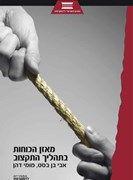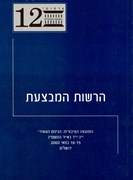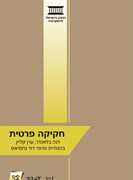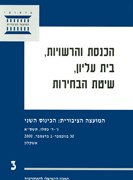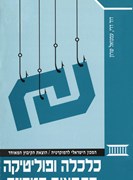

Publications Regarding government-Knesset relations
Articles

New Structure for the Government
Written By: Tomer Lotan, Vered Constantini
New Study by Tomer Lotan and Vered Constantini at the Israel Democracy Institute

Splitting Up Ministries Will Undermine Effective Governance and the Public Service
Written By: Dr. Nadiv Mordechay
The trend to divvy up the government in political agreements has reached new heights - with detrimental impact on the ministries ability to provide high-quality service
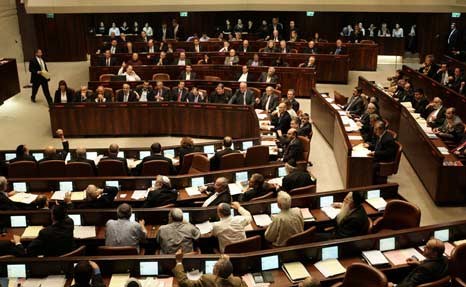
The Many Ways to Dissolve the Knesset 2022
Written By: Dr. Dana Blander
The unlikely coalition that survived thanks to the one vote has lost the parliamentary majority. Does this mean that the Knesset will disperse and new elections will be held? Dr. Dana Blander explains the different ways in which the Knesset can be dissolved and discusses the relationship between these mechanisms and government stability in a parliamentary system.

Halting Legislation in the Knesset and No Government Meetings
Written By: Dr. Amir Fuchs
With the exception of issues related to the coronavirus pandemic, this Knesset has passed almost no legislation, and this government has met only rarely.
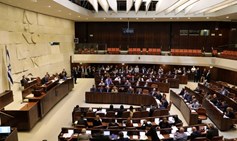
Government Unable to Manage Corona Crisis
"This fast-tracked legislation, that is intended to allow the cabinet to put further restrictions in place without approval from Knesset committees, is yet another example of chaos and an inability of the government to manage the coronavirus crisis."

Limit the Number of Ministers and Deputies
In light of the Movement Towards a National Emergency Government: 30 Ministers Would be Excessive in Comparison to other Parliamentary Democracies; The cap on the number of ministers and their deputy minister should remain in place.

Virus and Democracy
Written By: Prof. Yedidia Z. Stern
Even a life-saving measure must be weighed against the threat it poses to democracy -- we do it all the time

A Knesset in the Deep Freeze
Written By: Dr. Chen Friedberg
Those who are not familiar with the Knesset’s day-to-day activities may mistakenly believe that it normally functions efficiently.

Reduce the Number of Ministers
Written By: Prof. Ofer Kenig
As talks begin toward the formation of a new government – it is an opportunity to call on the Prime Minister to keep the number of Ministers low

Parliamentary Work Index for Israel’s Political Parties
Written By: Dr. Assaf Shapira, Avital Friedman, Dr. Shahaf Zamir
A Special Analysis by the Israel Democracy Institute on which MKs make the most use of the parliamentary tools available to them.

IDI Presents Outstanding Parliamentarian Award to MKs Elharar and Folkman
Knesset Speaker MK Yuli Edelstein: "It's time to bring the rules of the game back to the Knesset

Israel's Central Elections Committee: Political Cabal or Independent Agency?
Written By: Dr. Dana Blander
IDI Researcher Dr. Dana Blander discusses the role of Israel's Central Election Committee and asserts that change is needed in its structure, composition, and working methods.

23 Knesset Seats is Not a Victory
Written By: Yehoshua Oz
In an op-ed in the Jerusalem Post, Yehoshua Oz, IDI's Director of International Communications, argues that pundits eager to crown a victor in the 2015 elections have lost sight of the fact that winning one-fifth of the Knesset seats is no victory.

The Israeli Presidency: Unnecessary Institution or Vital Symbol?
Written By: Dr. Dana Blander
As the 2014 presidential election draws near, once again there have been calls to do away with the institution of the presidency. Is the President of Israel an unnecessary position or a vital symbol? IDI researcher Dr. Dana Blander analyzes the two sides of this question.

Who Will Guard the Guards?
Written By: Dr. Chen Friedberg
IDI Researcher Dr. Chen Friedberg warns that the government's prolonged inability to appoint a permanent head of the Knesset Foreign Affairs and Defense Committee may be causing serious harm to the very foundations of Israeli democracy.

The Limits of Party and Coalition Discipline
Written By: Reuven Rivlin
How much parliamentary independence should Knesset members have? To what extent must they toe their party's line? At a time when party discipline and coalitional discipline play a decisive role in determining the fate of Israeli policy and proposed legislation, MK Reuven (Ruby) Rivlin, Speaker of the Knesset, calls on parties to allow Knesset members to remain true to their conscience and to their role as representatives of the people.

Behind the Scenes of Israel's Ministerial Committee For Legislation
Written By: Dr. Dana Blander, Dr. Chen Friedberg
There are ways to transform this powerful committee into one that combines politics with professionalism, instead of being one more arena for the settling of political scores.

What remains of the religious status quo?
Written By: Dr. Shuki Friedman
Instead of Judaism being what unites Jews in Israel with Jews around the world, our religion has become the main source of conflict.


